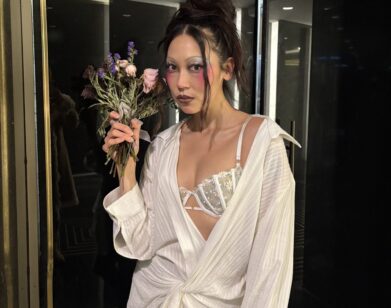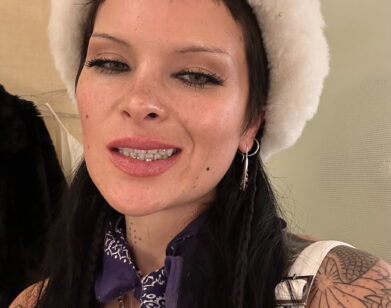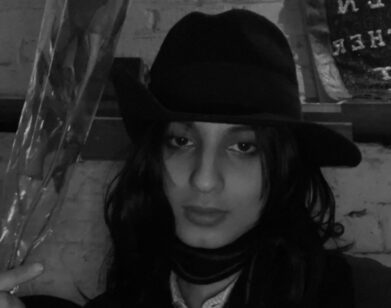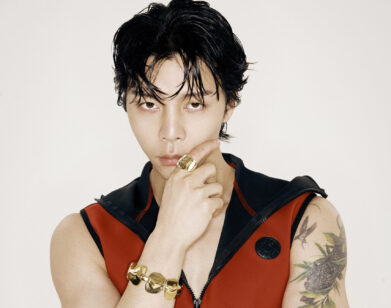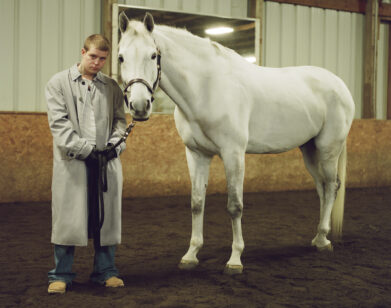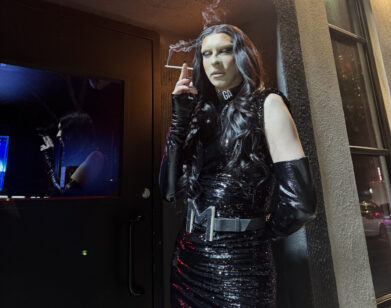Le1f’s Riot Movement
LE1F IN NEW YORK, OCTOBER 2015. PHOTOS: ANTHONY BLASKO. STYLING: CLAUDIA CIFU. GROOMING: CHRISTINE NELLI FOR EXCLUSIVE ARTISTS MANAGEMENT USING TATCHA SKINCARE.
New York-born, raised, and based rapper Le1f quickly rose to the top of New York’s nightlife and production scene following his graduation in 2011 from Wesleyan University, where he studied ballet and modern dance. Since then, the 26-year-old, born Khalif Diouf, has produced songs for the likes of Das Racist, whose often comedic lyrics are now reflected in some of Le1f’s own music. Although the performer has put out three mixtapes and two EPs, this Friday marks the release of his debut full-length Riot Boi (Terrible Records), which covers topics ranging from homophobia, transgender rights, and Black Lives Matter to sexual exploits and fashion.
Featuring collaborations with friends, such as Sophie, Junglepussy, DonChristian, and Dev Hynes, as well as family (his mother’s vocals are featured in “Change,” the album’s closing track), Riot Boi‘s 12 songs lyrically drift between the overtly serious and playful, all over beats made for dancing. Prior to the album’s release, Le1f spoke with his close friend and Hood by Air designer Shayne Oliver about music and being riot boys, but even more so about their cool moms and Uber.
LE1F: Thanks for doing this.
SHAYNE OLIVER: Of course. They gave me guidelines, but we can just flow. The first thing that really caught me was the title of the album.
LE1F: You want to talk about my album? Whaa! [both laugh]
OLIVER: I feel like it embodies a lot of our relationship, too. Being riot boys…
LE1F: I definitely made some of the album, some of those songs, wearing your clothes.
OLIVER: Can you talk about the definition of a riot boy? And what that means to you?
LE1F: I was thinking about riot grrrl music and the power that had, even though I really don’t fuck with it as a sound—just the take-back-the-night feeling it had and how that related to how I felt about myself as a rapper. I didn’t want to do an electro-class album or complex rap album. I wanted to do something that was kind of like a political statement, but also club jams. I wanted it to be dancy, but intelligent at the same time.
OLIVER: Do you feel like the title Riot Boi is more of a creative statement? Do you consider yourself to be a riot boy?
LE1F: I definitely do. I didn’t always because I went to private school for high school, but then I came back home and was living in the projects and still couldn’t get a job. I was like, “Oh, okay, this is what it is for black men, and gay men, and especially black gay men, and probably even more so for black women and black queer women.” I wanted to do something that was actually getting into my feelings. Making an album is like seeing a therapist.
OLIVER: I feel like that comes out a lot. Even based on our relationship, the places we hung out at were based in that energy.
LE1F: I was reminiscing, and I know I always tell you this story… It must’ve been 10 years ago, when we were 15 or 16 years old, just after I discovered Hood By Air [from] a press pic of M.I.A. in a Hood By Air classic hoodie, I saw you at a Trouble & Bass party, back when it was at this small Mexican bar in Brooklyn. That was the first time I had been star struck. There were so many people there that night—Drop the Lime, Kingdom, and Telfar—but I remember coming up to you and being so star struck. I was not really talking; it was like a speech impediment situation.
OLIVER: That’s really cute. [both laugh] I also feel like what you just said embodies a lot of what riot boy is. It has a lot to do with being a man outside and then having this community where you can voice it—it’s almost like a private club. Women speak out about issues they have. Ours is more internal, clubby, tight, like a boys club type thing.
LE1F: I think you were part of making it not a boys club. The scene at a certain time was definitely boys; those huge warehouses were kind of violent parties, even. I think people in your immediate community made a nightlife scene that actually did break down gender roles and were along different lines of identity that had to do with race and experience in the ’90s, rather than gender.
OLIVER: I love that it’s a title because I feel like that sort of person has been quiet for so long. You owning this is a really important thing. Riot boy is always on the side of the riot grrrl; it’s always an unspoken title.
LE1F: There is a masculinity in riot grrrl music, which is probably why I don’t identify with it, but also why it was so important and powerful. That is something our scene has—regardless of who is in it, it has this very powerful feminine energy, like a Nefertiti head bust or Storm from X-Men. It’s a woman you see as very powerful, sassy, arrogant, and dark.
OLIVER: Speaking of all of that, I saw your mom was on the album…Can you talk about that?
LE1F: You know, I’m the only person in my family who can’t sing. My grandmother was an opera singer and all of her kids were in church five days a week—or between church and vocal lessons at Carnegie Hall. But my mom had her first studio experience recording on my album. She’s used to having to fill the room, so she had to adjust to the microphone and not sing opera.
OLIVER: That’s amazing. I did not know that.
LE1F: I kind of want her to be a fashion icon. A question I have for you—I read an interview and you were talking about your mom. It seemed like she was an awesome person. I wanted to know if she was a creative influence for you? Is she a fashion icon mom?
OLIVER: Oh god! I don’t want to give her props because she’s so cool that it would actually cause relevance in her life right now. I’m just gonna say she really is pretty cool. She is a huge inspiration for me, for sure. She always taught me freedom in dress and always expressing yourself. Even if you’re wearing sweatpants or something extremely excessive, [there’s] the idea of what is it worth? Is this idea or outfit worth anything? Does it look good enough? She always gives me advice on collections and puts her little two cents in every single time she can.
LE1F: My mom’s the exact same way. I just don’t know if I picked up as well on it as you did.
OLIVER: As I get older, I realize I’m becoming her. I’ve realized that her thoughts did affect how I felt about stuff. No matter how crazy my outfit was she would always have an opinion. Usually it was “yes,” but sometimes she would be “no,” and I was like, “Whateva! This is supposed to punk…” She taught me that “Yeah, it’s punk, but if it doesn’t look good then you shouldn’t do it.”
LE1F: How was she dressing when you were a kid?
OLIVER: It was a lot of formal vintage stuff. It was all over the place, whatever she could find in Minnesota. That’s how I spent most of my time with her, in a fashion way. When we went to the Caribbean, it’s very reminiscent of what—she’s gonna hate it when I say this—but of what Telfar does now. My mom used to make stuff like that when I was young and would wear stuff like that.
LE1F: What were you wearing?
OLIVER: What was I wearing? At that time I was very into karate, taekwondo to be exact. I would mix all of my gear with normal outfits. I would mix my taekwondo gear with Nike—whatever hot guys were wearing at the time, I would mix it with that.
LE1F: How long did you take taekwondo? What’s your belt?
OLIVER: I’m a green with a black stripe in the middle. I got over it, slash it got too competitive. It got competitive in a way where people weren’t just trying to compete against me; they were trying to compete against the fact that I was excelling. I didn’t feel like I was part of the group anymore.
LE1F: So you could fuck somebody up?
OLIVER: I can, I know how to get it right. I’ve broken boards. I’ve broken levels of boards.
LE1F: Okay, now I know not to get on your bad side. [laughs]
OLIVER: You went crazy just now! Anyway… With your grandmother being musical, does your family pay a lot of attention to your work? Do they critique?
LE1F: My mom is too cool, actually too cool. It’s kind of a problem. She goes out—I ran into her at a Santigold concert once! Like I’ll come to her house and she’s blasting Teengirl Fantasy or Kelela—drinking a glass of Shiraz by herself, listening to Teengirl Fantasy, that’s her shit.
OLIVER: There are some other elements on the album I like. There’s one song that’s very Grace, Alicia, Naomi. How do you approach fashion in a musical sense? Do you feel like you do it as a fan?
LE1F: Yeah, it’s a bit more of that. My whole background was with bands, so I always thought of “fashion” as performative. It took me a long time to bridge the gap between my music and what I was studying in school, [which was] dance and being a performer. One time, the homie Venus[-X] read me; we were on the phone and she was like, “Girl, you keep wearing jeans and t-shirts at your shows, but the music doesn’t give that.” I was like, “You’re right, I need to be the person that I am at school, making dance and choreography. I should think about the whole performance.” That’s when I put the 1 in my name and started dressing for the occasion.
For the videos, I feel like the persona changes every song because I want to get the point of the specific song across. So it’s that and function—if I can dance in it, sweat in it, and take it off easily on stage.
OLIVER: That’s a very real point. What you’re doing has become such a staple. To me, the whole gay hip-hop thing—people can fall into that, but also into their own artistry. You do that; you take it to that level. You don’t talk about the shit that you don’t own, you know what I mean? We literally bump into each other all over the world. I don’t think a lot of kids, especially in hip-hop or even in the gay world, get that idea of being international or dipping into other cultures.
LE1F: I agree. Having had been not so well traveled as a kid, as most teenagers aren’t, I always thought, “Okay I’m going to focus my energy on rap and the rap game, because that’s how I’m going to be able to pay rent and pay off my school loans.” But seeing the reaction with this whole gay rap situation has made me not want to play into it at all anymore and just make whatever. Whether or not I can get an interview from hip-hop media, that’s not going to effect whether or not I can go on tour in Asia and Europe and see all of these different places and experiences. I know you know about that—I’m surprised you’re home!
OLIVER: I know! I’m staying in town because it takes a lot out of you. Not the physical part, but you’re almost like a psychiatrist. You’re constantly having to deal with different attitudes. After a while you’re like, “Okay, girl, I need to come back to New York and feel at home.” Like, if I wanna weed-out the cab driver, I can.
LE1F: Don’t tell me you have a bad Uber rating!
OLIVER: I don’t! No, no, no. [both laugh] But I’ve been trying to act like a New Yorker again, quote-unquote. I’m trying to subdue all the international diva moments, like Ubers. I’m like, “Let me take some city cabs,” but then I’m like, “Damn, I can’t fuck with this.”
LE1F: I’ve got a whole song about that on my record. I feel like it’s worse in New York than in other places to get a cab as a black man. It’s supposed to be the most diverse city in the world, but it’s not.
OLIVER: I was at dinner last night talking about—oh god I’m going off—this thot in New York. It’s like, “You saw me waiting for that cab and you just took it anyways”—she did the whole “Oh my god I didn’t know…” It’s not just white girls, but it’s that attitude. It’s like, “You’re really gonna get in my cab right now just because you think you’re more entitled than me?”
LE1F: I don’t take cabs anymore. I will only take an Uber.
OLIVER: It’s so much better. It’s a new world. You don’t have to deal with all that bullshit. But anyway, you were saying this whole idea of, “I don’t need to be on a hip-hop blog.” From the beginning, but more so even now, I feel like you have a very light moment. Can you talk a little bit about your idea of this light that’s incorporated into your very distinctive, strong vocals?
LE1F: My friend described me as “tears of a queen” when I get into that mode. Every record, there’s one or two songs when I’m expressing all my dark moments. There’s all these moments in-between where I need to do something that makes myself happy, something dumb—consistent with me trying to be an intelligent lyricist, but at the same time camp for no reason. Literally putting on my clown makeup and going to the party, being like, “Heeey, I’m cooler than you.” [laughs] It’s parallel to how Tweet did “Oops (Oh My),” but then you buy the album and she’s doing singer/songwriter songs about getting drunk.
OLIVER: Right, which is what I meant—it was so good for that reason. You knew the person was not so bubbly, so it’s like, “Okay let me check their album out,” and then it gets dark and that’s your favorite moment in the album.
LE1F: The single was like, “Yay,” but the album was the spiral. That’s kind of how, not intentionally, everything I do ends up turning out.
OLIVER: Right. What draws you to collaboration? Is it friendship? Is it meeting people? Is it hotness? [both laugh] What energy draws you to reach out to someone?
LE1F: It comes from the fact that I like the practice of process, in a seasonal or annual way. For me, going from dance to production, then being a producer for a while and deciding to rap, I wanted to have some time where I wasn’t producing. I was just writing and trying to perfect my writing. But having been a producer, I’m really picky. It would be about me trying to get the most ham beats possible. Fortunately, because of going to Ghe20 Gothik [underground parties in raw New York City clubs], Asma and Daniel of Nguzunguzu gave me the beats I recorded on for Dark York, the first mixtape. Because they gave me those beats, I think a lot of other people thought I was someone cool to work with. I became one of those people that people didn’t mind collaborating with.
OLIVER: This is kind of a weird question, but how do you know it’s right to start touring again? What is the moment that gets you amped to get on the road? Or is it the other way around?
LE1F: It’s the other way around because I’m a nomad. I feel more meditative when I don’t have a home. I like being put into a new place and making friends with people from a different culture, trying to find the lines of communication. It’s a lot of reflection of myself and seeing new scenery. I’ve always wanted to travel. My mom was a geography queen, I knew the atlas, and I looked at her pictures of all her world travels because she traveled a lot before I was born, with my brother. I was always so jealous. I kind of chose a job that would be a way I could see the world without having to pay for it. I’m not going to be a flight attendant. I’m way too busy to be that.
OLIVER: I need to know when the best of both worlds album is coming out between you and Kelela. What’s that whole relationship like? Is it beyond music? I feel like y’all are actually friends.
LE1F: We’re way too related. We’re probably separated siblings. We made that song “OICU” that’s up on SoundCloud, but we never released it on anything. She thinks in the same way I do, so focused on her music. She’s in L.A., constantly writing and smoking weed. When we get together it’s a stoner session. We smoke way too much weed, actually. That’s kind of what it is.
OLIVER: [laughs] When you have a friend circle where we’re all working, sometimes girls get in this way where the relationship becomes very social. People tend to start communicating in this robotic way only in reference to the social world.
LE1F: I love that shit. I love to be around all the girls, that inspires me so much. And I love to laugh and y’all are the funniest people in the world—you and Kelela, and Juliana and Dosha. I’m the one that always hangs out the whole time. I’m trying to not be the girl in the club when the lights come on anymore.
OLIVER: [laughs] I’m going to get robotic and read what they gave me: Le1f, in 2012 you told Interview, “I had a fear of failing as a rapper, but I realized more and more that I wasn’t lacking in talent, just confidence.” Now it seems like you’re more comfortable in your own skin. Do you feel that way? Is it the people you’re working with? What has changed?
LE1F: I think only my thought process changed. Sometimes both things are a challenge. I’m not singer; every time I have the urge to sing something, I don’t want to do it in front of certain people. I was always that kid afraid of failing, so I just didn’t do things. I don’t know how to ride a bike, I don’t know how to drive. I broke out of shell a bit, and I still am. I think it’s more about trying to be the full person I imagine myself to be, regardless of what that means in terms of labels, shade from people, and all of that.
OLIVER: For me, I saw a huge change in you when you began to incorporate more dancing. I know it’s always been there, but when you started doing visuals and videos—all these things to show people how you move in a recorded way—it created a playing field for you.
LE1F: That’s exactly what it is. It’s me trying to merge this post-modern performance art world that’s part of my art, what I want to do, and who I want to be, with the vocalist musician I want to be. Obviously Beyoncé, Janet Jackson, and Grace Jones are the great performers that know how to dance in a look while singing a song, but with that in mind, I have to find my own way of doing it as a man who isn’t a singer.
OLIVER: Right. I feel like the new generation doesn’t have a lot of patience. People listen to lyrics, but they don’t have the patience to engage with the lyrics as much as they used to, which sucks, but it’s just a sign of the times. Girls, like you, [FKA] Twigs, there’s something about it where you’re allowing your body to become part of the lyrics and people can engage with the music in a newer way.
LE1F: You think? That’s always what I wanted.
OLIVER: That’s the vibe it’s giving me, in a punk way, ready to practice a nasty move. It’s very goth-punk, in this way where it’s aggressively active, aggressively sporty, or aggressively athletic, in a way.
LE1F: That’s what your clothes give me. It’s the riot boy image. I feel like your design has been going more in that direction. I know it’s kind of cliché, but with lines and negative space relating to form and function, your stuff has been so anatomical, more and more—the cuts and the silhouettes, a jacket will be a purse at the same time. I have all these things that lends itself to nightlife or performance in amazing ways. Is that something you’re conscious of when you’re designing?
OLIVER: Yeah, for sure. I think that’s why I sort of recognized that in your sound. I recognize that same attitude in things that I try to do. Those things I identify with, when it comes to your work, is rare. The way you go about it is very performative; the language you create is very active and forceful.
LE1F: You said creating language, and you’re someone who has actually created language. The slang words you say have ended up on reality TV shows. I want to ask you one thing—from your Spring/Summer 2016 New York womenswear collection, there’s this pillow backpack inspired by a gift that Lucious [Lyon] gives Cookie after she tries to strangle him with a pillow in season one [of Empire]. [both laugh] Your Empire inspiration and having Lee Daniels and Bryshere, who plays Hakeem, be at the [runway] show and wearing the boots on season two—how did that happen? What’s that relationship like?
OLIVER: It’s something that builds organically. It’s sort of like the Classics line. With Classics I try to do commentary on visual things around me, and Empire was monumental in that sense. When I started doing graphics for Classics I started putting messages that had to do with celebrity and it created a response. That vibe put it out in the world that I was obsessed with Cookie and her ways.
Cookie was out, the Daddy collection just happened, and Lee reached out in a casual way. It was more so a friendship and seeing where it goes. I’m still feeling out what it means to do things that are inspired by a show. Cookie’s first season was too major for me to handle. For instance, I used a lot of Madonna tracks as show music or as a inspiration, but I’m not literally doing it; I’m subverting it in order for it to fit into the HBA world. Even Beyoncé, people that I’m obsessed with, I literally put them into the work and then figure out what it means for whatever I’m trying to do at the moment. That’s what’s going on and I don’t know where it’s going to go, but I will see. You will get a pillow book bag when you see me.
LE1F: [laughs] Thank you, because you know I’m about to put in my order.
RIOT BOI WILL BE RELEASED ON FRIDAY, NOVEMBER 13. FOR MORE ON LE1F, VISIT HIS WEBSITE.


